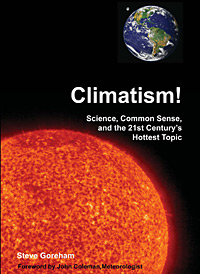CHAD: Panic, outcry at government charcoal ban January 16, 2009
Posted by honestclimate in Discussions.Tags: africa, al gore, climate change, climate change madness, global starving, global warming
trackback
Note from the blogowner, honestclimate:
It’s with great sadness and disbelief that I bring you this story of a  government ban on charcoal in Chad, Africa. Chad is is one of the poorest and most corrupt countries in the world with most Chadians living in poverty as subsistence herders and farmers. According to the United Nations’ Human Development Index, Chad is the fifth poorest country in the world, with 80% of the population living below the poverty line. Charcoal is the sole source of household fuel for about 99 percent of Chadians. Without charcoal they CANNOT cook or heat water.This is what the Environment Minister Ali Souleyman Dabye recently told the media in N’djamena:
government ban on charcoal in Chad, Africa. Chad is is one of the poorest and most corrupt countries in the world with most Chadians living in poverty as subsistence herders and farmers. According to the United Nations’ Human Development Index, Chad is the fifth poorest country in the world, with 80% of the population living below the poverty line. Charcoal is the sole source of household fuel for about 99 percent of Chadians. Without charcoal they CANNOT cook or heat water.This is what the Environment Minister Ali Souleyman Dabye recently told the media in N’djamena:
“Chadians must find other ways to cook and forget about charcoal and wood as fuel. Cooking is of course a fundamental necessity for every household. On the other hand…with climate change every citizen must protect his environment.”
The world truly has gone mad. Chadians must now starve to death to combat climate change? In the mean time the likes of Al Gore are making millions out of climate change alarmism whilst living it up in mansions with limos and yachts etc. Evidently they never have to worry about where their next meal will come from. Whilst people starve to death in Africa, they are living off the rich pickings of their climate change alarmism. I’ll say it again, the world truly has gone mad.
—————————————————————————————————————–
CHAD: Panic, outcry at government charcoal ban
H/T Tom Nelson
 Photo: IRIN  |
| The Chadian government says its ban on tree-cutting for household fuel is essential to fight desertification (file photo) |
N’DJAMENA, 16 January 2009 (IRIN) – A government ban on charcoal in the Chadian capital N’djamena has created what one observer called “explosive” conditions as families desperately seek the means to cook.
“As we speak women and children are on the outskirts of N’djamena scavenging for dead branches, cow dung or the occasional scrap of charcoal,” Merlin Totinon Nguébétan, head of the UN Human Settlements Programme (HABITAT) in Chad, told IRIN from the capital. “People cannot cook.”
“Women giving birth cannot even find a bit of charcoal to heat water for washing,” Céline Narmadji, with the Association of Women for Development in Chad, told IRIN.
Unions and other civil society groups say the government failed to prepare the population or make alternative household fuels available when it halted all transport of charcoal and cooking wood into the capital in December in a move, officials said, to protect the environment.
Charcoal is the sole source of household fuel for about 99 percent of Chadians, N’djamena residents told IRIN.
With the government blocking all entry of charcoal into N’djamena, and reportedly confiscating any found in the city, charcoal has become nearly impossible to come by, aid workers and residents said. And when it is found, a bag that used to cost about 6,000 CFA francs (US12) is now sold, clandestinely, at about four times that.
Climate change
Government officials said the charcoal ban was part of an effort to halt tree-cutting for fuel, which they said was essential to fight desertification. The government has attempted to block tree-cutting in the past but has severely cracked down in recent weeks, aid workers and residents told IRIN.
“Chadians must find other ways to cook and forget about charcoal and wood as fuel,” Environment Minister Ali Souleyman Dabye recently told the media in N’djamena. “Cooking is of course a fundamental necessity for every household. On the other hand…with climate change every citizen must protect his environment.”
Officials said the ban includes only charcoal made from freshly-cut trees, not that made from dead wood lying about. But all wood and charcoal is being blocked from entering N’djamena, residents said.
Amid panic and protests over the ban another government official said at a 14 January press conference that the government made a mistake in not preparing the public, but he announced no change. “It is a gaffe; to err is human,” said Nouradine Delwa Kassiré Coumakoye, president of the government’s Social, Economic and Cultural Council.
He called on Chadians to stay calm, saying: “The government can resolve this crisis and find a solution.”
The Chadian Prime Minister on 15 January met with the leader of a national consumers’ rights association, according to the government website.
“Crying out”
Residents and aid experts told IRIN the charcoal ban has complicated already dire living conditions in the city.
“All families in N’djamena are crying out,” Delphine Djiraibé Kemneloum, coordinator of the Monitoring Committee for Peace and Reconciliation, told IRIN.
UN-HABITAT’s Nguébétan said: “This is quite a grave situation because Chadians have always used charcoal for cooking and for heating water.” Many Chadians also make a living from selling charcoal.
“We all agree that desertification is a serious problem that Chad must address,” he said. “But the government must supplement its measures with alternatives for the population.”
The government has mentioned alternatives such as propane but “only abstractly,” Nguébétan said.
Residents said few people use propane in N’djamena, and it is scarce. People who can afford to are traveling across the border to Cameroon to buy gas.
Protest put down
Soldiers and police on 14 January dispersed crowds who gathered in the capital to protest the government’s action as well as the overall high cost of living, people in the capital told IRIN.
“They hit demonstrators, who were mostly women,” said the women’s association’s Narmadji, who was among the marchers.
“Until the government makes a change we will not give up,” she said. “Better to die swiftly and en masse than to continue dying slowly as we are now.” Then she added: “We are already dead.”

































A further maddening addendum: Chad is plagued with an alternative source for charcoal whose exploitation would drastically improve everything: Typha. The Typha Australis infestation in Lake Chad and its environs is the dessication machine expanding the deserts. When grown in clean water, Typha is a top notch food crop. What isn’t fit for human consumption can be pyrolized into charcoal or brewed into ethanol. The environmental side effects of clearing it would include reduced malaria without toxic chemicals.
Hi My Name is hawa and I am half Chadian. I live in the U.S right now, but after hearing this absurd news, I am going back to chad and film these people’s stories and broadcast it to the world. People in Africa are being treated like they are nothing. THEY ARE INVISIBLE! But their LIVES are important. How can an oil rich country starve its own people like that? This is unfair, cruel and should not be happening. If there is any way you guys can help me out, I would love it.
I majored in International Relations at SFSU and I am going back to my country and I’m going to do all that I can for this news to be heard everywhere. My people CANNOT die slowly like this.
[…] here to read how Africans are starving to death to “prevent climate […]
[…] He explained that he started feeling guilty at the plight of those starving to death in Africa, particularly those in Chad where the government has banned the use of charcoal to “prevent climate change”. […]
This is absolutely despicable that the government would even think of doing this its horrible to even imagine what their people are going through. I feel so blessed living in australia and being able to access so many things that i take for granted i think its time that Australia and America put their heads together to do something that is effective and help thease people. This is the first i have herd about this. I think it needs to be known around the world what is really occuring in some of thease countries.
[…] more examples of this sort of climate change madness affecting the poor, click here and […]